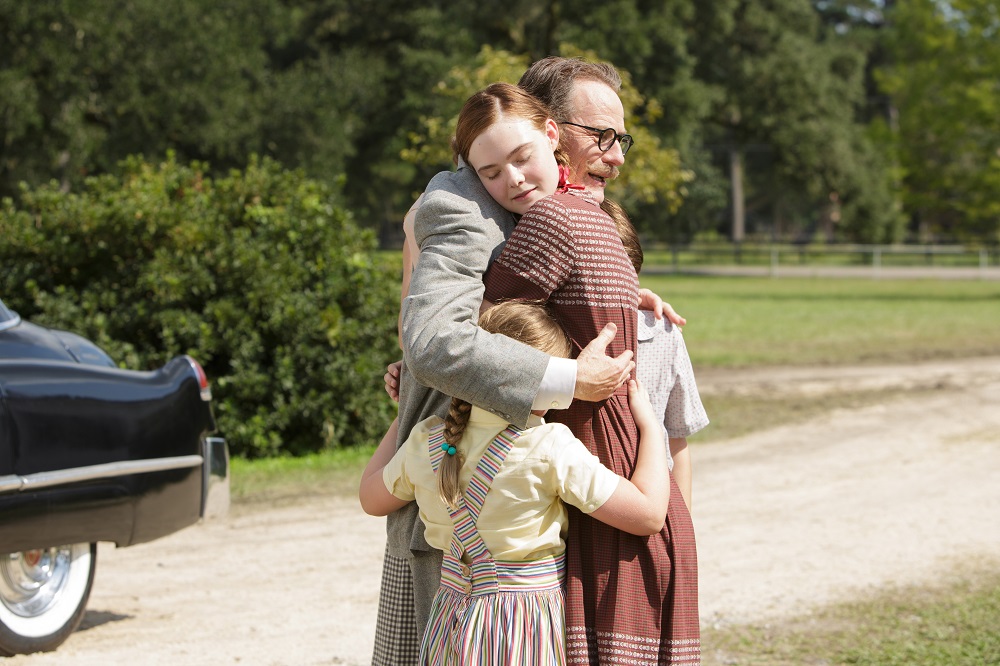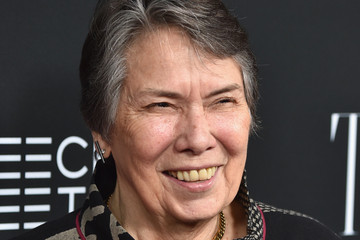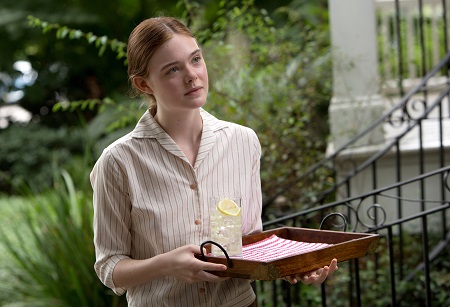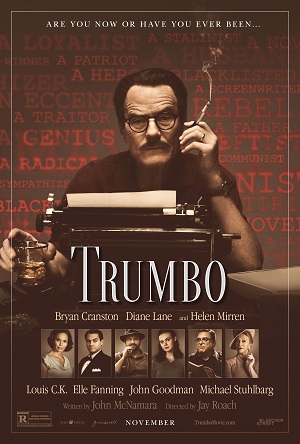
“Trumbo” – Interview with Niki Trumbo
by Sara Michelle Fetters - December 4th, 2015 - Interviews
‘I Lived It’
Niki Trumbo On the Movie Chronicling Her Famous Father’s Life – Trumbo
It goes without saying that Niki Trumbo would have unusually intimate insight others would not likely possess in regards to director Jay Roach’s Trumbo. After all, the movie is a biopic of her two-time Academy Award-winning screenwriter father, Dalton Trumbo (portrayed by Bryan Cranston), after all, so she was front and center for all of the events depicted within the confines of the 124-minute opus. The majority of the picture focuses on his blacklisting in Hollywood after he and several of his fellow writers stood up to the House Un-American Activities Committee (HUAC), each accused of being communists, all unwilling to throw others under the bus just so they could stay out of jail.
“It was weird,” laughs Niki Trumbo, “watching portions of it that first time. We went to New Orleans to visit the set and one of the producers showed us a little five minute clip of the birthday scene, and it just undid me. I was just in tears. I can’t exactly explain what it feels like, to see yourself – although it is not you – in a scene you never were really in or happened exactly like it was depicted but the essence of which of the emotion and what I was feeling during that time is all right there. It’s a little overwhelming.”
A Seattle resident, I was able to sit down for a few minutes with Niki at the downtown Fairmont Olympic Hotel to discuss her father, the film and what the entire process of having a Hollywood filmmaker dig so deeply into her life has been like. Although brief, our conversation was a consistently engaging one, and for my part it time flew by way too quickly.
“I love this movie,” she says with a massive grin. “I love it so much. I like the father-daughter story because it is representative to what so much of our relationship was like. I love how they’ve depicted Trumbo. I love Bryan’s performance. There is nothing about this movie that I can think of that I don’t like.”
There’s a wonderful sequence early on in the film where Dalton and Niki are horseback riding, and it is here the daughter asks her loving dad to explain communism to her. It’s a wonderful moment, perfectly sublime in both delivery and impact, allowing the viewer instant insight into who this man was, his thought process and his deep, overwhelming desire to be a good father even as he knows a storm of immeasurable power and size is about to descend upon him and his family. Granted, it also never happened. At least, not all at once, and not as depicted in the film.
“No,” she chuckles, “we never had a conversation like that one while riding horses. That’s made up. But it’s also what I was referring to earlier. It’s another essence moment, a scene that fits what was going on at the time and the emotions we were feeling, but not actual reality. The real moment was more like me asking, ‘Daddy, are you a communist?’ and him replying that he was. The follow-up question was something like, ‘Can I be a communist when I grow up?’ and I wanted him to say that of course I could be; that he’d be so proud of me if I was. Instead he told me I had to be 21 before I could make decisions like that. I had to be old enough to vote. I was so disappointed!”
“Of course, what I wanted was his approval more than I wanted to be a communist. But, I also think he didn’t want to influence my political beliefs, so he wanted to distance himself a little bit from doing that until I was older and could actually talk about, discuss and debate those sort of topics from a place of mutual understanding.”
A statement which makes a lot of sense when you look at Dalton Trumbo’s Hollywood career. While his point of view is arguably never in doubt, the majority of his most noteworthy scripts, ranging from Roman Holiday, to The Brave One, to Spartacus, to Lonely Are the Brave (if only to name just a few), still allow the viewer to make up their own minds in regards to the deeper themes lurking within each of them. They trade in varying shades of grey. More, they treat every character with humongous respect, even the most risible and loathsome of villain in need of human sympathy and understanding, each film all the better because of this.
“I hadn’t thought of that before,” responds Niki candidly. “When it’s your father, you don’t do a real thorough critique of stuff like that. I do think you’re right. He left it to the viewer to decide how they felt about things. But, I also think his stuff is thematic, often one man against the world, that sort of thing. In Lonely Are the Brave it’s one rugged, old-fashioned guy against the world. In The Brave One, it’s one boy against the world trying to save his beloved bull.When you think about it, I do think this is a common theme that runs throughout every single picture.”
“Of course, does [my father] really leave you to decide on your own or does he lead you there? I mean, we do know what his point of view was, right? A good writer can get you to exactly where they want you to go and make you believe you’ve gotten there all by yourself.”
As to Niki’s involvement in the making of the film itself, she made it a point to let her thoughts as to how things were progressing be known. “Staying away was the last thing I wanted to do,” she says proudly. “No. In all honesty, John McNamara, who wrote the script, which I think is so unusual and so incredibly brilliant, he sent me a cover letter along with the script asking if we, my sister Mitzi and I, would be willing to comment. They had been working on it for a while and said that he was thick-skinned and would not be offended by anything we had to say. Said he was genuinely interested in our thoughts.”
“I read it, and there were parts I wasn’t crazy about and there were parts I liked very much. I thought, if they’re really going to make this movie than I had better get involved, so I wrote back John with all my comments and he in turn asked if he could come and see me. We ended up having two long meetings and there were reams of email conversations, probably three reams, as we worked closely with him all the way through. He said he was a stubborn man and he was incredibly stubborn, and sometimes he listened to us and sometimes there were things he was absolutely not going to change, but overall he was a joy to work with.”
And what needed changing? Not that much, actually. “It really wasn’t about changing anything,” admits Niki, “at least, not very often. It was more to just fill in the character, as Trumbo has been dead for years, and there are very few people still alive who knew him, especially in regards to his peers. So, to try and give a feel for who he was, what he was really like, to bring the family into it all, how he related to us, who we all were, that was what was most important to me.”
The film’s second half takes a rather microscopic look Trumbo’s time, not just writing under a pseudonym, but also organizing fellow blacklisted screenwriters to do the same. It’s all fairly fascinating, especially the portions depicting the pressures being placed on the family during this period. As such, it was the one section of the film his eldest daughter had the most trouble watching. At least initially.
“At first it was very hard to watch,” admits Niki. “Brought back a lot of memories. But, almost as suddenly it wasn’t hard to watch. I lived it. I was there. As a teenager, I just knew I wasn’t very happy with what was going on and that I didn’t like having this man controlling my life. I did all the things a rebellious teenager would say or would feel. But, looking at it like this, it actually gave me some welcome distance. I could see the pressure my father was under, could see all he was doing in order to keep us as a family all afloat.”
“Not that I feel guilty for wanting my own space. I don’t. But it was nice to recognize, from an adult perspective, how tough that was on everybody.”
It’s also equally difficult for Niki to imagine she’d have lived the life she has had her family hadn’t had to endure these travails. While managing to keep herself out of the headlines, Dalton Trumbo’s eldest daughter has hardly lived a quiet life, standing up as an activist on a variety of issues, most revolving around civil rights or people of all backgrounds, genders and ethnicities.
“You’re probably right,” she admits. “I think I’d have grown up such a different person had I lived a normal Hollywood life in Beverly Hills. We lived in Beverly Hills, briefly, and I remember going trick or treating as a five-year-old and someone was handing out silver dollars, silver dollars in 1940-something. Think about that? I mean, there’s no way to think that by living around all of that, being in that world, I’d have ended up the person I am today. The principles that my family held, particularly my father, were so important. There was safety, somehow, in knowing that he knew what he was doing. I might not have always liked it, but he really did seem in charge and he was going to see us through all of this, somehow. And he did. You can’t help but learn from that.”
The remaining elephant sitting in the middle of the room, at least as far as our conversation was concerned, was undoubtedly what Niki thought of how she was portrayed in the film, most notably by up and coming young star Elle Fanning. Her response hardly took me by surprise. “[Elle] is just a remarkable young woman,” she states without hesitation. “I don’t know how she does it. God knows where we’ll see her go next. She’s just so talented and does such a splendid job here. I couldn’t have been more pleased by what she does.”
As we were wrapping up, I couldn’t help but wonder if another real life Hollywood icon depicted in the film had seen it and if she knew what he thought of it. “You want to know about Kirk Douglas,” chuckles Niki, her response more of a knowing statement than a question. “Kirk has seen the film. He made a statement, and I can’t remember if it was in reference to seeing the film, or in reading the script, but it was, ‘Why am I not in the first scene?’ That’s just so Kirk.”
“In all seriousness, Kirk has seen the film and he likes it a lot, as far as know. He’s very happy with how the breaking of the blacklist is resolved within the movie. I think he’s still very proud of the part he played there. People tend to forget to give both Kirk and [Exodus director] Otto Preminger enough credit for what they did as far as helping put the final nail in the coffin of the blacklist. Also, can you imagine sitting in your living room on Christmas morning opening presents with Otto Preminger standing there? It really did happen. And, when we were done, he really did say, ‘Christmas is over!’ and he and my father went right back to work writing Exodus.”
And what does Dalton Trumbo’s daughter hope audiences take away after watching a film pulled from her family’s history? “I hope audiences see in Dalton Trumbo an example of a man who really did stand up for his principles and see an example of courage we could all aspire to. We could all be so brave. We just have to make the conscious choice to do so.”
– Portions of this interview reprinted courtesy of the SGN in Seattle






